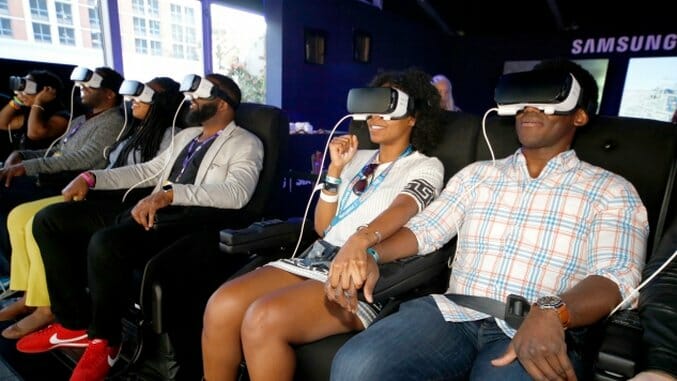Emerson College’s VR Filmmaking Class is Preparing Students to Lead the Industry

Emerson College recently launched a groundbreaking virtual reality filmmaking class at its Los Angeles based campus. This is a good sign for the growing VR industry, as more film schools are starting to offer VR filmmaking courses to inspire students to work toward being leaders in the field. Following Emerson’s launch in January, New York University held its first VR class at their Tisch School of the Arts taught by Saschka Unseld, the creative director at Oculus Story Studio.
The Emerson Los Angeles (ELA) class launched in January during the Spring semester of their Los Angeles “Study Abroad” program for junior and senior students. Micah Wright, who has written and designed almost 50 video games, like Call of Duty: Black Ops II and has worked in film, television and comic books, teaches the class of about 10 students. Wright believes the emergence of virtual reality is the next step for both the video game and film industry.
“The marketplace for VR is coming and Emerson College understands that,” he says. Wright first proposed the course to Kevin Bright, ELA Vice President and Founding Director, and Dr. Mikhail Gershovich, ELA Director of Academic Planning and Digital Learning.
“This course presented a timely opportunity for us to pilot something truly innovative and unique that could have a tremendous impact on the College and our students going forward,” Gershovich said in an article announcing the program’s launch. “Because the language of narrative storytelling in VR is only just beginning to emerge, this course offers our students a chance to contribute meaningfully to the development of a new art form—and that’s rare and exciting.”
The VR filmmaking class is designed for students to explore live action filmmaking for virtual reality headsets. The program provides the students with necessary software and equipment, teaching them how to create 360-degree spherical films so they are able to leave the class with content and experience to add to their portfolio. In a growing, yet somewhat small industry like VR, any experience will help students break in, and companies are looking for up and coming talent.
Jack Siberine, a senior at Emerson pursing a degree in directing, says the class has provided a good mix of hands-on learning and group discussion about the latest technology and future of the industry.
-

-

-

-

-

-

-

-

-

-

-

-

-

-

-

-

-

-

-

-

-

-

-

-

-

-

-

-

-

-

-

-

-

-

-

-

-

-

-

-








































